- Home
- Herman Melville
The Paradise of Bachelors and the Tartarus of Maids Page 2
The Paradise of Bachelors and the Tartarus of Maids Read online
Page 2
acenic scenery. A fifth had a funny case in law
to tell. A sixth was erudite in wines. A sev-
enth had a strange characteristic anecdote of the
private life of the Iron Duke, never printed, and
never before announced in any public or private
company. An eighth had lately been amusing
his evenings, now and then, with translating a
comic poem of Pulci's. He quoted for us the
more amusing passages.
And so the evening slipped along, the hours
told, not by a water-clock, like King Alfred's,
but a wine-chronometer. Meantime the table
seemed a sort of Epsom Heath; a regular ring,
where the decanters galloped round. For fear
one decanter should not with sufficient speed
reach his destination, another was sent express
after him to hurry him; and then a third to
hurry the second; and so on with a fourth and
fifth. And throughout all this nothing loud,
nothing unmannerly, nothing turbulent. I am
quite sure, from the scrupulous gravity and aus-
terity of his air, that had Socrates, the field-
marshal, perceived aught of indecorum in the
the company he served, he would have forth-
with departed without giving warning. I after-
ward learned that, during the repast, an invalid
bachelor in an adjoining chamber enjoyed his
first sound refreshing slumber in three long,
weary weeks.
It was the very perfection of quiet absorption
of good living, good drinking, good feeling, and
good talk. We were a band of brothers. Com-
fort -- fraternal, household comfort, was the grand
trait of the affair. Also, you could plainly see
that these easy-hearted men had no wives or
children to give an anxious thought. Almost all
of them were travelers, too; for bachelors alone
can travel freely, and without any twinges of
their consciences touching desertion of the fire-
side.
The thing called pain, the bugbear styled
trouble -- those two legends seemed preposter-
ous to their bachelor imaginations. How could
men of liberal sense, ripe scholarship in the
world, and capacious philosophical and con-
vivial understandings -- how could they suffer
themselves to be imposed upon by such monk-
ishfables? Pain! Trouble! As well talk of
Catholic miracles. No such thing. -- Pass the
sherry, Sir. -- Pooh, pooh! Can't be! -- The port,
Sir, if you please. Nonsense; don't tell me so.
-- The decanter stops with you, Sir, I believe.
And so it went.
Not long after the cloth was drawn our host
glanced significantly upon Socrates, who, sol-
emnly stepping to the stand, returned with an
immense convolved horn, a regular Jericho
horn, mounted with polished silver, and other-
wise chased and curiously enriched; not omit-
ting two life-like goat's heads, with four more
horns of solid silver, projecting from opposite
sides of the mouth of the noble main horn.
Not having heard that our host was a per-
former on the bugle, I was surprised to see him
lift this horn from the table, as if he were about
to blow an inspiring blast. But I was relieved
from this, and set quite right as touching the
purposes of the horn, by his now inserting his
thumb and forefinger into its mouth; where-
upon a slight aroma was stirred up, and my
nostrils were greeted with the smell of some
choice Rappee. It was a mull of snuff. It
went the rounds. Capital idea this, thought I,
of taking snuff at about this juncture. This good-
ly fashion must be introduced among my coun-
trymen at home, further ruminated I.
The remarkable decorum of the nine bach-
elors -- a decorum not to be affected by any
quantity of wine -- a decorum unassailable by
any degree of mirthfulness -- this was again set
in a forcible light to me, by now observing that,
though they took snuff very freely, yet not a
man so far violated the proprieties, or so far
molested the invalid bachelor in the adjoining
room as to indulge himself in a sneeze. The
snuff was snuffed silently, as if it had been
some fine innoxious powder brushed off the
wings of butterflies.
But fine though they be, bachelors' dinners,
like bachelors' lives, can not endure forever.
The time came for breaking up. One by one
the bachelors took their hats, and two by two,
and arm-in-arm they descended, still convers-
ing, to the flagging of the court; some going to
their neighboring chambers to turn over the
Decameron ere retiring for the night; some to
to smoke a cigar, promenading in the garden on
the cool river-side; some to make for the street,
call a hack, and be driven snugly to their dis-
tant lodgings.
I was the last lingerer.
"Well," said my smiling host, "what do you
think of the Temple here, and the sort of life
we bachelors make out to live in it?"
"Sir," said I, with a burst of admiring can-
dor -- "Sir, this is the very Paradise of Bach-
elors!"
II. THE TARTARUS OF MAIDS.
It lies not far from Woedolor Mountain in
New England. Turning to the east, right out
from among bright farms and sunny meadows,
nodding in early June with odorous grasses, you
enter ascendingly among bleak hills. These
gradually close in upon a dusky pass, which,
from the violent Gulf Stream of air unceasing-
ly driving between its cloven walls of haggard
rock, as well as from the tradition of a crazy
spinster's hut having long ago stood somewhere
hereabouts, is called the Mad Maid's Bellows'-
pipe.
Winding along at the bottom of the gorge is
a dangerously narrow wheel-road, occupying the
bed of a former torrent. Following this road
to its highest point, you stand as within a
Dantean gateway. From the steepness of the
walls here, their strangely ebon hue, and the
sudden contraction of the gorge, this particular
point is called the Black Notch. The ravine
now expandingly descends into a great, purple,
hopper-shaped hollow, far sunk among many
Plutonian, shaggy-wooded mountains. By the
country people this hollow is called the Devil's
Dungeon. Sounds of torrents fall on all sides
upon the ear. These rapid waters unite at
last in one turbid brick-colored stream, boiling
through a flume among enormous boulders.
They call this strange-colored torrent Blood
River. Gaining a dark precipice it wheels sud-
denly to the west, and makes one maniac spring
of sixty feet into the arms of a stunted wood of
gray haired pines, between which it thence eddies
on its further way down to the invisible low-
lands.
Conspicuously crowning a rock
y bluff high
to one side, at the cataract's verge, is the ruin
of an old saw-mill, built in those primitive times
when vast pines and hemlocks superabounded
throughout the neighboring region. The black-
mossed bulk of those immense, rough-hewn,
and spike-knotted logs, here and there tumbled
all together, in long abandonment and decay,
or left in solitary, perilous projection over the
cataract's gloomy brink, impart to this rude
wooden ruin not only much of the aspect of one
of rough-quarried stone, but also a sort of
feudal, Rhineland, and Thurmberg look, derived
from the pinnacled wildness of the neighboring
scenery.
Not far from the bottom of the Dungeon
stands a large white-washed building, relieved,
like some great whited sepulchre, against the
sullen background of mountain-side firs, and
other hardy evergreens, inaccessibly rising in
grim terraces for some two thousand feet.
The building is a paper-mill.
Having embarked on a large scale in the seeds-
man's business (so extensively and broadcast,
indeed, that at length my seeds were distributed
through all the Eastern and Northern States
and even fell into the far soil of Missouri and
the Carolinas), the demand for paper at my
place became so great, that the expenditure
soon amounted to a most important item in the
general account. It need hardly be hinted how
paper comes into use with seedsmen, as en-
velopes. These are mostly made of yellowish
paper, folded square; and when filled, are all
but flat, and being stamped, and superscribed
with the nature of the seeds contained, assume
not a little the appearance of business-letters
ready for the mail. Of these small envelopes I
used an incredible quantity -- several hundreds
of thousands in a year. For a time I had purchased
my paper from the wholesale dealers in
a neighboring town. For economy's sake, and
partly for the adventure of the trip, I now resolved
to cross the mountains, some sixty miles,
and order my future paper at the Devil's Dun-
geon paper-mill.
The sleighing being uncommonly fine toward
the end of January, and promising to hold so
for no small period, in spite of the bitter cold I
started one gray Friday noon in my pung, well
fitted with buffalo and wolf robes; and, spend-
ingone night on the road, next noon came in
sight of Woedolor Mountain.
The far summit fairly smoked with frost;
white vapors curled up from its white-wooded
top, as from a chimney. The intense congela-
tion made the whole country look like one
petrifaction. The steel shoes of my pung
craunched and gritted over the vitreous, chippy
snow, as if it had been broken glass. The forests
here and there skirting the route, feeling the
same all-stiffening influence, their inmost fibres
penetrated with the cold, strangely groaned --
not in the swaying branches merely, but like-
wise in the vertical trunk -- as the fitful gusts re-
morselessly swept through them. Brittle with
excessive frost, many colossal tough-grained
maples, snapped in twain like pipe-stems, cum-
bered the unfeeling earth.
Flaked all over with frozen sweat, white as a
milky ram, his nostrils at each breath sending
forth two horn-shaped shoots of heated respira-
tion, Black, my good horse, but six years old,
started at a sudden turn, where, right across the
track -- not ten minutes fallen -- an old distorted
hemlock lay, darkly undulatory as an anaconda.
Gaining the Bellows'-pipe, the violent blast,
dead from behind, all but shoved my high-back-
ed pung up-hill. The gust shrieked through
the shivered pass, as if laden with lost spirits
bound to the unhappy world. Ere gaining the
summit, Black, my horse, as if exasperated by
the cutting wind, slung out with his strong hind
legs, tore the light pung straight up-hill, and
sweeping grazingly through the narrow notch,
sped downward madly past the ruined saw-mill.
Into the Devil's Dungeon horse and cataract
rushed together.
With might and main, quitting my seat and
robes, and standing backward, with one foot
braced against the dash-board, I rasped and
churned the bit, and stopped him just in time
to avoid collision, at a turn, with the bleak noz-
zle of a rock, couchant like a lion in the way --
a road-side rock.
At first I could not discover the paper-mill.
The whole hollow gleamed with the white,
except, here and there, where a pinnacle of
granite showed one wind-swept angle bare. The
mountains stood pinned in shrouds -- a pass of
Alpine corpses. Where stands the mill? Sud-
denly a whirling, humming sound broke upon
my ear. I looked, and there, like an arrested
avalanche, lay the large whitewashed factory.
It was subordinately surrounded by a cluster of
other and smaller buildings, some of which, from
their cheap, blank air, great length, gregarious
windows, and comfortless expression, no doubt
were boarding-houses of the operatives. A
snow-white hamlet amidst the snows. Various
rude, irregular squares and courts resulted from
the somewhat picturesque clusterings of these
buildings, owing to the broken, rocky nature of
the ground, which forbade all method in their
relative arrangement. Several narrow lanes
and alleys, too, partly blocked with snow fallen
from the roof, cut up the hamlet in all direc-
tions.
When, turning from the traveled highway,
jingling with bells of numerous farmers -- who
availing themselves of the fine sleighing, were
dragging their wood to market -- and frequently
diversified with swift cutters dashing from inn
to inn of the scattered villages -- when, I say,
turning from that bustling main-road, I by de-
grees wound into the Mad Maid's Bellows'-pipe,
and saw the grim Black Notch beyond, then some-
thing latent, as well as something obvious in the
time and scene, strangely brought back to my
mind my first sight of dark and grimy Temple-
Bar. And when Black, my horse, went darting
through the Notch, perilously grazing its rocky
wall, I remembered being in a runaway London
omnibus, which in much the same sort of style,
though by no means at an equal rate, dashed
through the ancient arch of Wren. Though the
two objects did by no means completely corre-
spond, yet this partial inadequacy but served to
tinge the similitude not less with the vividness
than the disorder of a dream. So that, when upon
reining up at the protruding rock I at last
caught sight of the quaint groupings of the fac-
tory-buildings, and with the traveled highway
and the Notch behind, found myself all alone,
silently and privily stealing through deep-cloven
passages into this sequestered spot, and saw the
long, high-gabled main factory edifice, with a
rude tower -- for hoisting heavy boxes -- at one
end, standing among its crowded outbuildings
and boarding-houses, as the Temple Church
amidst the surrounding offices and dormitories,
and when the marvelous retirement of this mys-
terious mountain nook fastened its whole spell
upon me, then, what memory lacked, all trib-
utary imagination furnished, and I said to my-
self, "This is the very counterpart of the Paradise
of Bachelors, but snowed upon, and frost-paint-
ed to a sepulchre."
Dismounting, and warily picking my way
down the dangerous declivity -- horse and man
both sliding now and then upon the icy ledges
-- at length I drove, or the blast drove me, into
the largest square, before one side of the main
edifice. Piercingly and shrilly the shotted blast
blew by the corner; and redly and demoniacally
boiled Blood River at one side. A long wood-
pile, of many scores of cords, all glittering in
mail of crusted ice, stood crosswise in the
square. A row of horse-posts, their north sides
plastered with adhesive snow, flanked the fac-
tory wall. The bleak frost packed and paved
the square as with some ringing metal.
The inverted similitude recurred -- "The
sweet tranquil Temple garden, with the Thames
bordering its green beds," strangely meditated I.
But where are the gay bachelors?
Then, as I and my horse stood shivering in
the wind-spray, a girl ran from a neighboring
dormitory door, and throwing her thin apron
over her bare head, made for the opposite
building.
"One moment, my girl; is there no shed
hereabouts which I may drive into?"
Pausing, she turned upon me a face pale with
work, and blue with cold; an eye supernatural
with unrelated misery.
''Nay," faltered I, "I mistook you. Go on;
I want nothing."
Leading my horse close to the door from
which she had come, I knocked. Another pale,
blue girl appeared, shivering in the doorway as, to
prevent the blast, she jealously held the door ajar.
"Nay, I mistake again. In God's name shut
the door. But hold, is there no man about?"
That moment a dark-complexioned well-

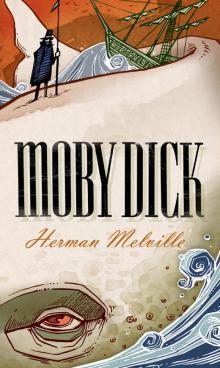 Moby Dick; Or, The Whale
Moby Dick; Or, The Whale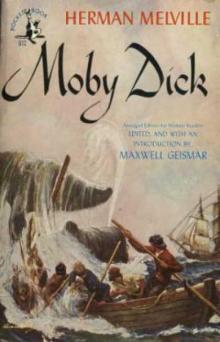 Moby Dick
Moby Dick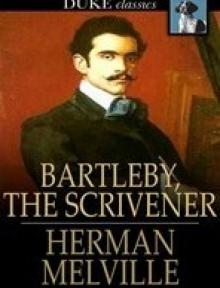 Benito Cereno and Bartleby the Scrivener
Benito Cereno and Bartleby the Scrivener Israel Potter: His Fifty Years of Exile (Annotated Edition)
Israel Potter: His Fifty Years of Exile (Annotated Edition)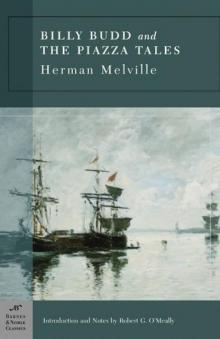 Billy Budd and the Piazza Tales
Billy Budd and the Piazza Tales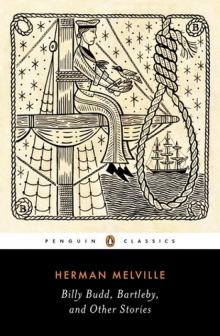 Billy Budd, Bartleby, and Other Stories
Billy Budd, Bartleby, and Other Stories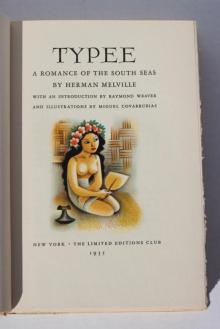 Typee: A Romance of the South Seas
Typee: A Romance of the South Seas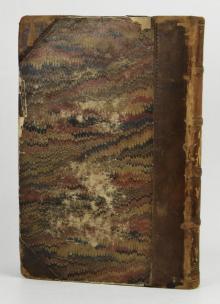 Omoo: Adventures in the South Seas
Omoo: Adventures in the South Seas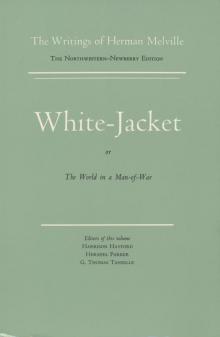 White Jacket; Or, The World on a Man-of-War
White Jacket; Or, The World on a Man-of-War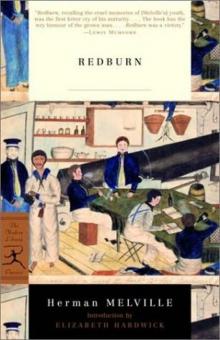 Redburn. His First Voyage
Redburn. His First Voyage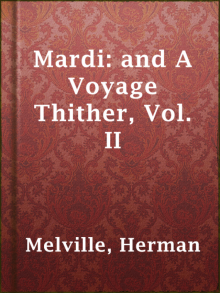 Mardi: and A Voyage Thither, Vol. II
Mardi: and A Voyage Thither, Vol. II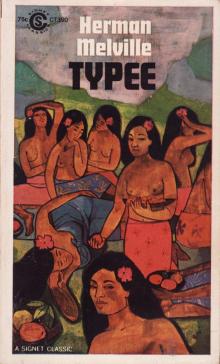 Typee
Typee The Paradise of Bachelors and the Tartarus of Maids
The Paradise of Bachelors and the Tartarus of Maids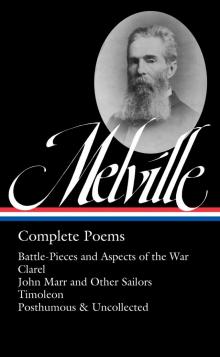 Herman Melville- Complete Poems
Herman Melville- Complete Poems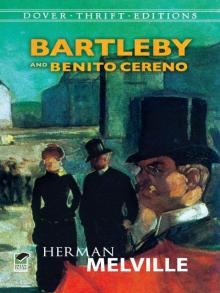 Bartleby and Benito Cereno
Bartleby and Benito Cereno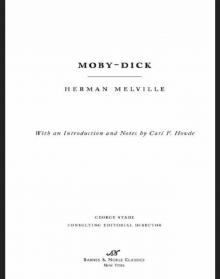 Moby-Dick (Barnes & Noble Classics Series)
Moby-Dick (Barnes & Noble Classics Series)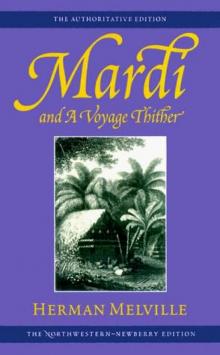 Mardi and a Voyage Thither
Mardi and a Voyage Thither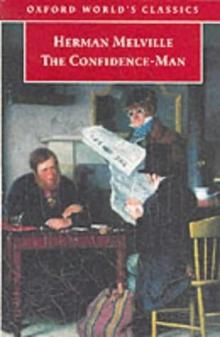 The Confidence-Man
The Confidence-Man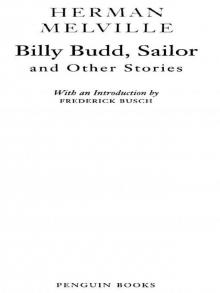 Billy Budd and Other Stories
Billy Budd and Other Stories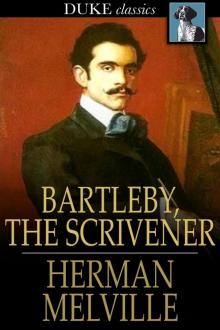 Bartleby the Scrivener
Bartleby the Scrivener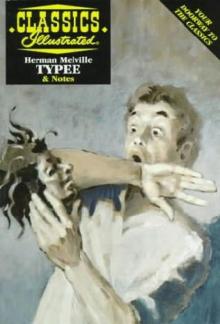 Typee: A Romance of the South Sea
Typee: A Romance of the South Sea I and My Chimney
I and My Chimney Billy Budd
Billy Budd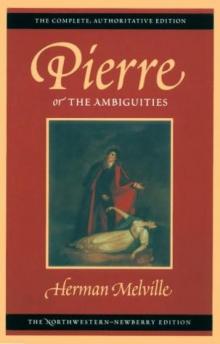 Pierre, Or the Ambiguities
Pierre, Or the Ambiguities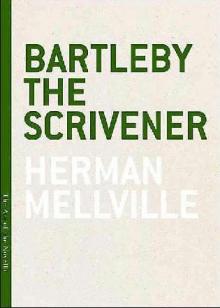 Bartleby, The Scrivener A Story of Wall-Street
Bartleby, The Scrivener A Story of Wall-Street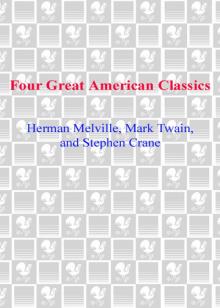 Four Great American Classics
Four Great American Classics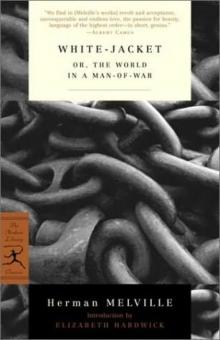 White Jacket or, The World on a Man-of-War
White Jacket or, The World on a Man-of-War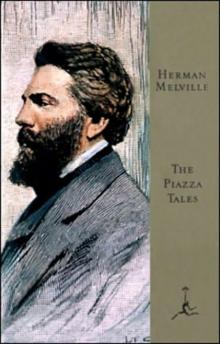 The Piazza Tales
The Piazza Tales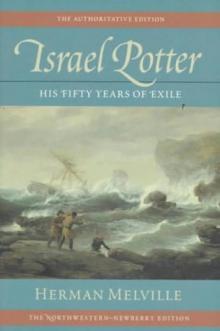 Israel Potter. Fifty Years of Exile
Israel Potter. Fifty Years of Exile